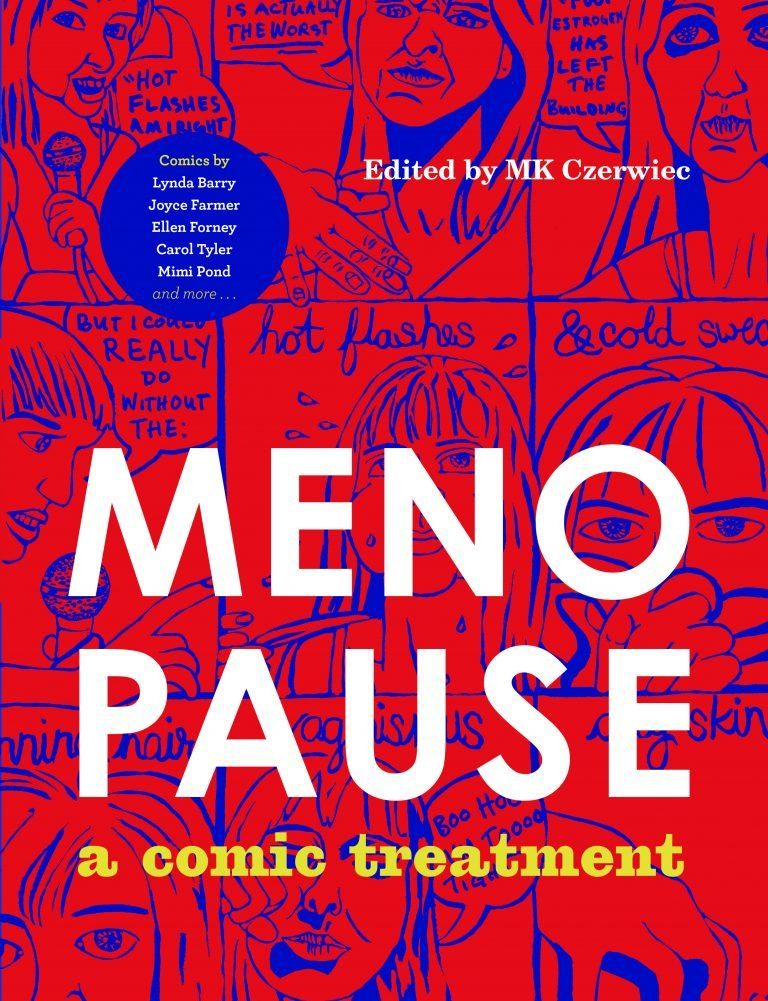Ph: 06 280 0938
Whaea-power and the Mentalpause…
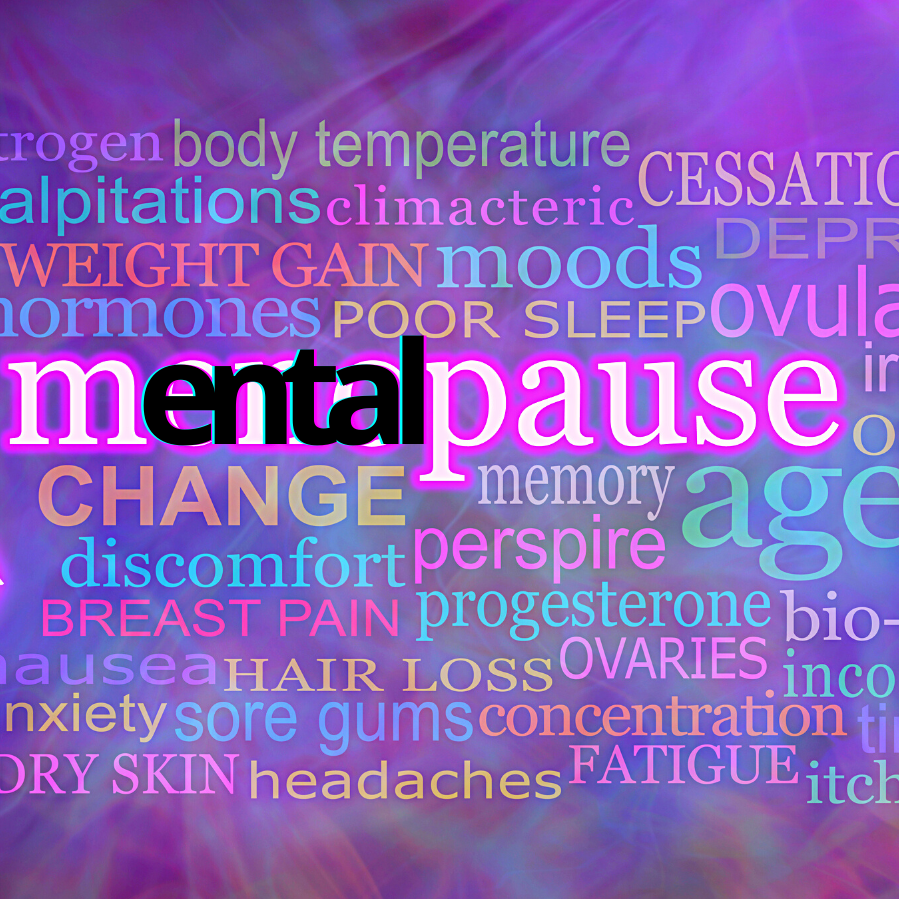
Bettina Anderson, a Collective Intelligence member and staffer, shares her experiences of the ‘mentalpause’ and reflects on Collective Intelligence’s newly-minted ‘Menstrual and Menopause Policy’
It started to dawn on me in 2019…
Heading along to my immersion te reo class at the local wānanga, I found my younger classmates calling me “Whaea” (Aunty) and offering to get me cups of tea! They then held back in the acceptable way when it was time to line up for kai so the kuia, which also appeared to include this pink-haired pākēhā woman who considered herself still to be ‘young’, could go first.
Could this be respect for my age? “But I’m not old!”, my 48-year old inner voice shrieked (take note, I have not been a shrieker up until now). Then other signs began to creep in…the palpitating heart at night, the light-headedness, the mysterious creaky aches and pains and misbehaving joints, the brain fog (oh… the brain fog…), the dry skin, the fury (more about that later!), and irrational desires to throw and kill things (and a complete lack of desire for other things).
Demonic possession and the perimenopausors…
An evil presence appeared to be taking me over, or maybe, I was just morphing into a middle-aged evil troll after a lifetime of being a ‘nice girl?’
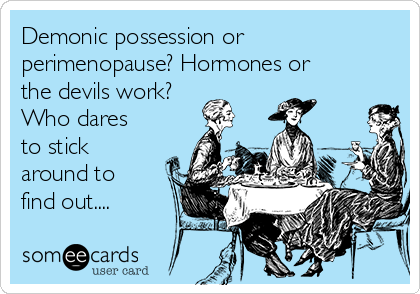
Fast forward a couple of years and that evil troll is still here, but I now have a better idea who it is, what it’s trying to do to me and why, and it has a name – a clunky western science name – ‘perimenopause’.
With a handle like that it could be a magical creature from the Harry Potter realm:
"Perimenopausors: closely related to Dementors, they are a similar type of phantom species who, as their name suggests, gradually deprive the minds of women of a certain age of happiness, confidence and intelligence."
I’d much rather the te ao Māori name, te ruahinetanga, it’s so much more poetic!
In physiological terms, the ‘pause’ can also be referred to as a climacteric (what tf?):
"Physiology. a period of decrease of reproductive capacity in men and women, culminating, in women, in the menopause."
That c-word has some other technical definitions, including this one which I much prefer:
"The period of maximum respiration in a fruit, during which it becomes fully ripened."
Fully ripened. That’s an inspiring mental image to hold onto, rather than those handed down to me that are variations on the theme of being shrivelled up – an empty husk. Or those that evoke a light fuzz of mould (or meno fuzz!) courtesy of you being pushed to the back of the shelf, since it seems you are well past your use by date.
The mentalpause…and a rack
As I’m currently experiencing it, I’ve nicknamed it the ‘mentalpause’. It’s been seriously affecting my mental (not to mention physical) health. I’m teetering on a weird growth edge, another rite of passage in my journey through life. A final transition of the age-old female trinity, I have ticked off the ‘maiden to mother’, and now time to do ‘mother to crone’. But seriously – it’s not a frickken PAUSE of any sort – more like the mix-tape of life unspooling off the reel into a sweaty little puddle on the floor.
I must have bunked the lesson where it was mentioned that if you have children later in life (aged 39 for me), it can result in a bit of an unpleasant traffic jam with ‘mother’ and ‘crone’ overlapping. Referred to as the ‘sandwich generation’ – it’s where you find yourself squeezed between a need to care for your children / partner / other dependants (dog, guinea pigs, chooks), and elderly parents who are smack in the middle of when their infirmities require your care too. Ada Colhoun in her fab book, Why Can’t we Sleep, prefers to say that she’s part of the ‘rack generation’, where you’re tied hand and foot, with a generation on either end of the rack tugging on you mercilessly.
However you manage such competing demands on yourself, throw into the mix an array of mental-pausal symptoms and it all plays havoc with your sense of self, your confidence, and it can seriously impact on your ability to cope.
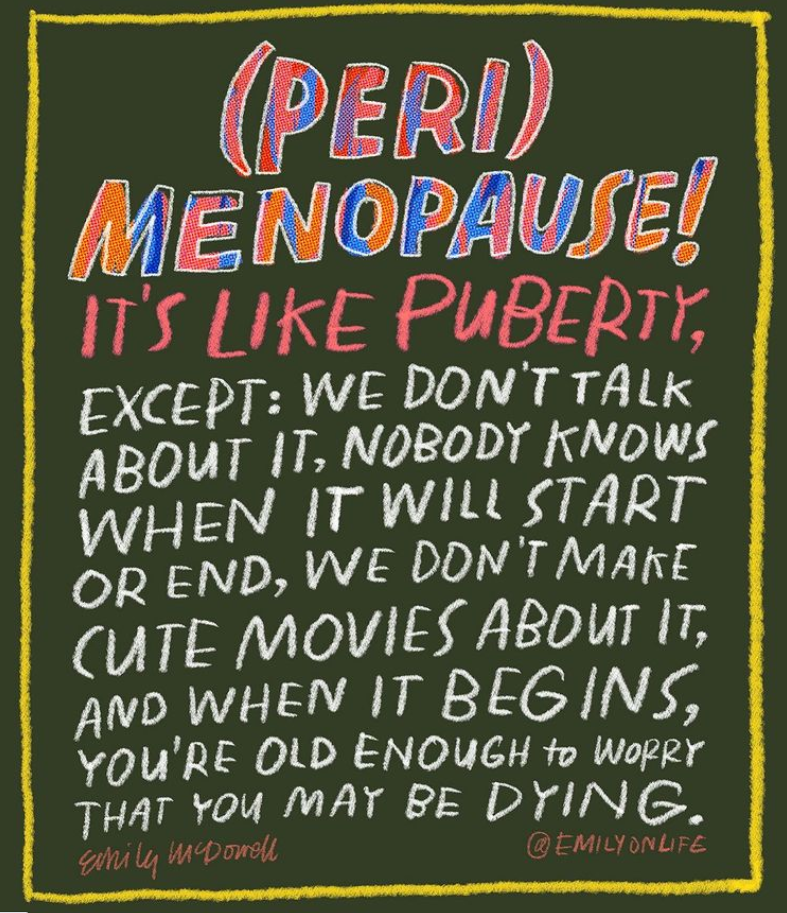
When you think you might be dying
I’ve heard this comment from far too many friends, it’s when those perimenopause symptoms first hit and you feel overwhelmed and like utter crap, and your skittish mind immediately starts to think you’ve got something dire. Sorry ladies, it’s just those hormones drying up!
As a kid I remember being told ‘she has the change’ in hushed tones, and such a time often punctuated with disappearances into hospital for ‘women’s problems’. My own mum went through menopause early, when she was 43. It was all over in a blip she says and, “all I did was drink a bit of yarrow tea”. Hmm, no tea-blips for me and many of my mates, as we navigate extended periods of our bodies rebelling as the ebb-tide of hormones start to show some of their nasty side effects.
I’m not usually an over-sharer, but it would have been nice to know a bit more about what to expect on this journey. Here’s my ‘shopping list’ of symptoms in rough chronological order of their appearance over the last couple of years (along with some of my irrational self-diagnoses of the time):
- Heart palpitations at night (damn – too much caffeine before bed!)
- Grumpiness
- Aches/pains and creaky joints (my family history of early onset arthritis kicking in!?)
- Grumpiness
- Weird itches (have I caught something from the dog /child?)
- Grumpiness
- Brain fog, fuzzy thinking, memory loss (oh god – now it’s the alzheimer’s kicking in!) and a general drop in confidence.
- Grumpiness escalating to inexplicable fury and irrational desires to hit and throw things (largely at all the males who I share a household with!) (fark!! mental health issues rearing their ugly head).
- Blood floods. Yip. For any fellas reading this, welcome to the concept of 6-week long periods – where even those absorbent boom things they use for oil spills would not have made a dent in the tide. It’s a bit like having a baby again as you can’t go anywhere without lugging a capacious ‘meno’ bag housing a change of undies, and a selection of absorbent devices and if all else fails – drugs.
- Grumpiness, grumpiness, and more grumpiness and, because I feel so rotten now, all served up with a big side of frumpiness!
- And then to top it off, serious anemia and extreme fatigue (because now there is hardly a drop of the red stuff left inside my body!)
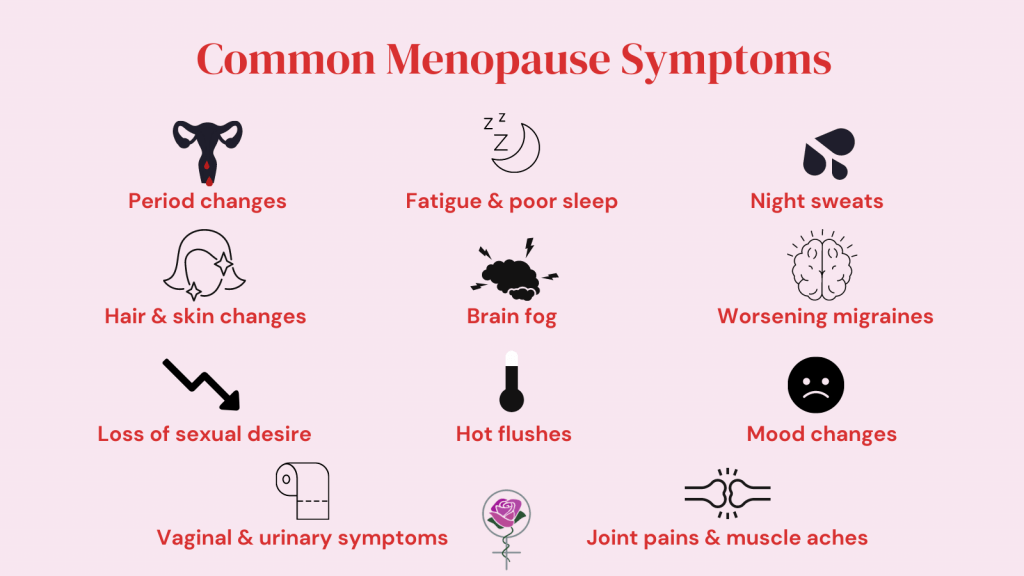
After sinking to an all-time low earlier this year under the weight of the above, I did a stack of research and sought medical intervention. Now, post- (what my male gyno referred to as) my ‘60,000km service’, and thanks to a little device that delivers one half of my now non-existent hormones (progesterone) I’m a somewhat regenerated version of my old self. Main debilitating physical symptoms: now largely sorted (but plenty still left), some of the mental symptoms: more manageable, but now the dreaded hot flushes have kicked in. Time to go see about dosing me up with the other tag-team hormone I’m missing – estrogen.
Dragging your sorry mentalpausal carcass off to work
We are still so woefully ill-prepared for the mentalpause’s arrival, despite it affecting some 50% of humanity. I’m part of a generation where growing up that segment of a woman’s life suffered a load of taboo and was not talked about much – although that’s thankfully well on the way to changing.
These stats from a survey of 3000 UK women shared in a recent My Menopause Doctor post on LinkedIn caught my eye:
And got me wondering if women in Aotearoa suffered similar stats? It’s hard to find any published data, other than this stat:
"About 70% of women have significant symptoms with menopause and 40% will see a doctor because of their symptoms."
I started thinking about the impact of mentalpause on women in the workplace after listening to Steven Moe’s Seeds Podcast with Jeanette Kehoe-Perkinson on normalising the menopause conversation and strategies to retain menopausal women in New Zealand workplaces.
I consider myself very lucky to work for a B Corp-certified company that looks after its staff. We’ve just put in place a new ‘Menstrual and Menopause Policy’. It’s nothing particularly fancy, and was adapted from an Australian source, and simply reads:
We recognise that periods, menopause (and their associated symptoms) can have a serious impact at certain times on our staff’s daily life and ability to work. Experiences of menstruation and menopause can be very debilitating, yet we have been conditioned to mask their existence in the workplace, at schools and at home. It is important to us that we help remove the stigma and taboo surrounding menstruation and menopause.
As a small business we want to support our employees in their ability to adequately self-care during their period and menopause, without unduly having to deplete their sick leave, and we provide the following options (depending on the employee’s needs):
- The possibility of working from home when needs dictate (arranged in consultation with our office manager); and
- The opportunity to stay in the workplace under circumstances which encourage the comfort of the employee e.g. resting /working in a quiet area.
Brilliant! What a difference acknowledging it makes. I work part-time for a workplace that operates in full flexi-mode (staff work partly from home as needs require) and I’m grateful that in the worst of times for me when I was feeling lousy, I did not have to pretend to be awesome, get dressed, and show up… but could simply get by on functioning and feel sorry for myself in my own space.
Some things that I’ve found that help
- Good friends. It takes a team (or a village back in the day when crones were acceptable community elders) to get through this stage and sharing the symptoms, ups and downs, and strategies that work really helps. There’s even a group, Menopause over Martinis, that’ll help you host a dinner with your mates to get the conversations rolling (and they have a great NZ-flavoured facebook group).
- Random strangers. Nothing like an out of the blue conversation with strangers. Like the woman who spotted me sniggering over the meno-comic book mentioned below in our public library, and we shared a couple of crazy-crone tales. Or the conversation I had with my very young physio when filling out the new-patient medical form. Under pre-existing health conditions I drew a new tick-box and added ‘Perimenopausal’ and then had to explain why I felt that was something she needed to know about.
- Education. I found the website, free support app Balance, and podcasts of UK menopause expert, Dr Louise Newson, to be a real life-saver when I was actively researching my options for Hormone Replacement Therapy (HRT). Episode 82 of her podcast “The Personal & Professional Costs of the Menopause” is also a good listen! She presents a great evidence-based approach to the science of menopause and has a very pragmatic outlook:
Menopause needs to be thought of as a long term hormone deficiency.
-Dr Louise Newson
- Music. For a bit of fun you can’t go past the Menopause Rhapsody – a Bohemian Rhapsody Parody Song for every Queen.
- Humour. Laugh till you leak! There’s a bloody good book called “Menopause – a comic treatment” by MK Czerwiec. This anthology features a diverse cartel of artistic people (of both gender and sexual orientation) who cartooned their experiences with menopause and how they coped. It’s a book that shows there are many ways to respond to this phase of life, and you can invite it in and respond with ‘menopositive’ style!
Some things we need to talk about more
Shame. It’s an emotion that can feature a lot in perimenopause, hitting you with unexpected force – feelings of being worthless, expired, out of date, that you’re a ticking time bomb healthwise (all those messages to ‘look after your bones’, ‘plump your wrinkles’, ‘dye out your grey hairs’, ‘fill your pants with incontinence pads’, ‘exercise or you’ll die…’). But why should the state of my ovaries define me and how I feel?
Anger. Where the heck does this come from!? Are we venting years of pent-up frustration? Is it righteous rage or just the lack-of-hormones talking?
Privilege. I know managing perimenopause and retrieving my wellness with the help of the medical profession was made all the easier thanks to my privilege. So many women of my age work hard at physical jobs that present many challenges for navigating a really bad day/week/month and what it entails, and then what about the ‘young’ grandparents, who are full-time carers for grandkids – the list goes on. Who is helping them and how can we help the helpers?
Invisibility. As they say, you could get away with a crime now you’ve hit menopause! It can be quite confronting that people want to talk over you, bump into you, and seem to value your opinion less (or do they, or is it just your hormonal-deficient mind playing tricks on you again!?). Film director Jane Campion famously once said, “we become invisible and unf*ckable”.
There’s a delightful cartoon in the comic book mentioned above, where the central ‘pausal’ character decides her hot flushes are actually her life-long ‘give-a-shits’ burning off (because post-menopausal women report a sense of freedom they had not known in their younger years). Her take is that things like, “what people think of me”, “my need for approval”, “worrying about chin hairs” and “not asking for help when you need it” need to burn off, and you need to notice their volatilisation. Hence why a hot flush wakes you up at night (although there is a good medical reason for it too!).
Seems like Helen Mirren had a similar idea:
At 70 years old, if I could give my younger self one piece of advice, it would be to use the words ‘f*ck off’ much more frequently.
So. Perimenopause.
Like every other transition in life, it too shall pass – leaving growth rings behind.
(A)men-o-pause to that.
Bettina Anderson – June 2021
Connect with Bettina on LinkedIn
PS: If in reading this you have something to share – feel free to email me and I’ll add it.
Crowd-Sourced Reader Comments:
From Sue Johnston (a Collective Intelligence Facilitator & ex-Nurse):
- I share your frustration with the silence around this life stage. I am still appalled that GPs have no evidence-based guidelines (like they do for heart disease!) to guide them with their care of women. HRT is their only tool in their tool box.
- My own wellness journey was pretty full on through menopause. I put on 30 kgs, and experienced many other weird symptoms. I spent thousands of dollars trying all manner of things and finally found Wendy Sweet’s My Menopause transformation programme. She’s a Kiwi-registered nurse with a PhD on the topic of women and menopause. Some good practical stuff to deal with hot flushes and weight gain amongst other things.
- On the lighter side, I loved the Euphemia Sage Chronicles written by a Wairarapa-based GP – all about a superhero whose powers are only activated once she hits menopause. Look out for ‘Hot Flush’ and ‘No Sweat’.
Collective Intelligence 2022 ©



